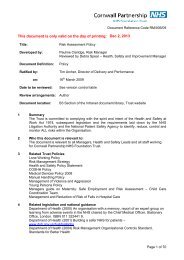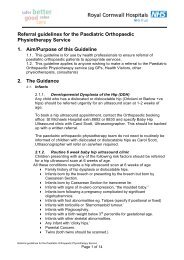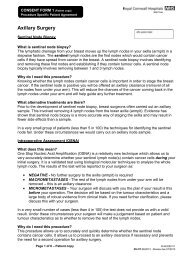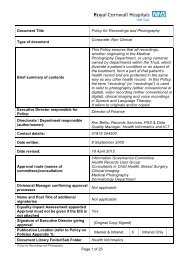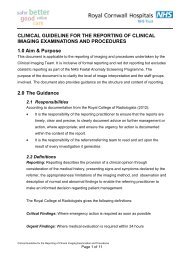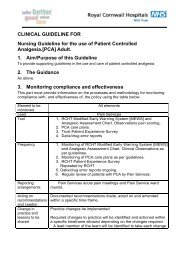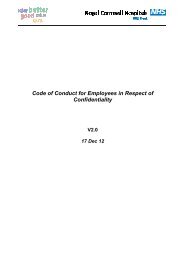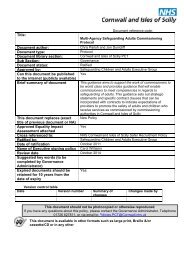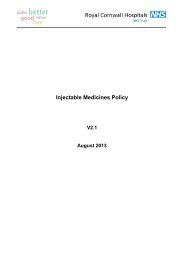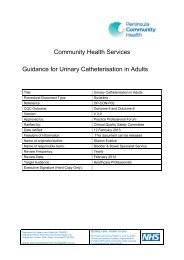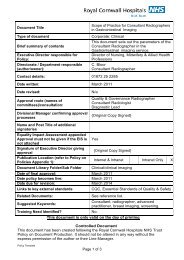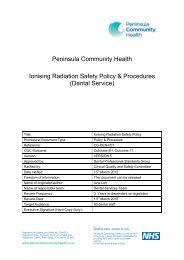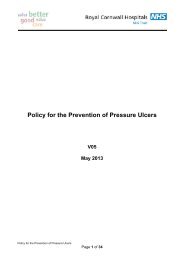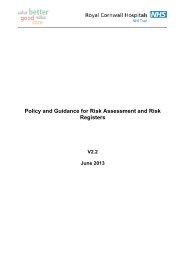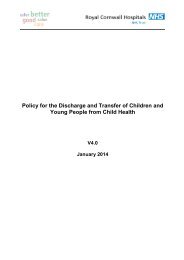Discretionary Leave Policy - the Royal Cornwall Hospitals Trust ...
Discretionary Leave Policy - the Royal Cornwall Hospitals Trust ...
Discretionary Leave Policy - the Royal Cornwall Hospitals Trust ...
Create successful ePaper yourself
Turn your PDF publications into a flip-book with our unique Google optimized e-Paper software.
Peninsula Community Health<br />
DISCRETIONARY LEAVE<br />
POLICY<br />
Title:<br />
DISCRETIONARY LEAVE POLICY<br />
Procedural Document Type:<br />
<strong>Policy</strong><br />
Reference: HRP 09<br />
CQC Outcome: 13<br />
Version: 1.1<br />
Approved by: JPC (21.05.13)<br />
Ratified by:<br />
CQSC<br />
Date ratified: 17.06.13<br />
Name of originator/author:<br />
Wendy Underwood<br />
Name of responsible team:<br />
Human Resources<br />
Review Frequency:<br />
3 Years<br />
Review Date: June 2016<br />
Target Audience:<br />
Line Managers and All Staff<br />
Executive Signature (Hard Copy Only):<br />
Registered in England and Wales No: 7564579<br />
Registered office: Peninsula Community Health CIC,<br />
Sedgemoor Centre, Priory Road, St Austell PL25 5AS<br />
www.peninsulacommunityhealth.co.uk<br />
Quality care, closer to you<br />
Peninsula Community Health is a not for profit<br />
Community Interest Company responsible for<br />
providing NHS adult community health<br />
services<br />
in <strong>Cornwall</strong> and <strong>the</strong> Isles of Scilly
Contents<br />
1 Purpose 3<br />
2 Definitions 3<br />
3 Duties 3<br />
3.1 The Organisation 3<br />
4 <strong>Discretionary</strong> <strong>Leave</strong> <strong>Policy</strong> 3<br />
4.1 The Process 3<br />
4.2 Recording of <strong>Discretionary</strong> <strong>Leave</strong> 4<br />
4.3 Compassionate <strong>Leave</strong> 5<br />
4.4 Progressive Illness 5<br />
4.5 Carer’s <strong>Leave</strong> 5<br />
4.6 Domestic Incident <strong>Leave</strong> 6<br />
4.7 Extreme Wea<strong>the</strong>r Conditions 6<br />
4.8 Time off for Doctors, Dentists, Hospital or o<strong>the</strong>r appointments 7<br />
4.9 Public Duties 7<br />
4.10 School Governor 7<br />
4.11 Jury Service 7<br />
4.12 Local Government Activities 8<br />
4.13 Magisterial Duties 8<br />
4.14 Training for <strong>the</strong> Reserve, Cadet Forces and Special Constabulary 8<br />
4.15 Time off to attend an interview 8<br />
4.16 Professional Organisations 8<br />
4.17 Time off to Move House 8<br />
4.18 Unpaid <strong>Leave</strong> (Short Term and Extended) 9<br />
4.19 Refusal of <strong>Discretionary</strong> <strong>Leave</strong> 9<br />
5 Risk Management Strategy Implementation 9<br />
5.1 Implementation 9<br />
5.2 Training and Support 9<br />
5.3 Dissemination 9<br />
5.4 Storing <strong>the</strong> Procedural Document 10<br />
5.5 Equality Impact Assessment 10<br />
6 Process for Monitoring Effective Implementation 10<br />
7 Associated Documentation 10<br />
8 References 10<br />
APPENDICES
A <strong>Discretionary</strong> <strong>Leave</strong> Flow Chart 12<br />
B <strong>Discretionary</strong> <strong>Leave</strong> Recording Form 13<br />
C Equality Impact Assessment 14<br />
2
1. Purpose<br />
1.1 The purpose of this <strong>Discretionary</strong> <strong>Leave</strong> <strong>Policy</strong> is to inform employees of <strong>the</strong> support, help<br />
and procedure that is available to deal with any situation that may require time off.<br />
1.2 There are several types of discretionary leave, some are paid and o<strong>the</strong>rs are unpaid.<br />
<strong>Discretionary</strong> leave is offered to help employees deal with situations that may require time<br />
off.<br />
1.3 <strong>Leave</strong> should be taken in accordance with operational need, and must be duly applied for<br />
and authorised. Notification of any leave should be agreed by <strong>the</strong> Manager as soon as<br />
possible prior to leave being taken, along with any proof required.<br />
2. Definitions<br />
2.1 Policies and Procedures<br />
3. Duties<br />
3.1 The Organisation<br />
Peninsula Community Health (PCH) will ensure:<br />
<br />
<br />
<strong>the</strong> provisions of this policy and procedure are conducted fairly and reasonably;<br />
all employees are informed about and have access to <strong>the</strong> contents of this policy and<br />
procedure.<br />
4. <strong>Discretionary</strong> <strong>Leave</strong> <strong>Policy</strong><br />
4.1 The Process<br />
4.1.1 The Organisation understands that in some cases it is necessary for employees to take<br />
leave with immediate effect and in <strong>the</strong>se circumstances it is important that managers are<br />
informed as quickly as possible so that cover can be arranged as necessary. If <strong>the</strong><br />
employee knows that a situation may arise which means that <strong>the</strong>y would need leave with<br />
immediate effect, <strong>the</strong>y must inform <strong>the</strong>ir manager that this is likely. In all circumstances <strong>the</strong><br />
following process should be followed:<br />
a) Staff should discuss with <strong>the</strong>ir manager <strong>the</strong>ir need for leave and provide appropriate<br />
details, as requested;<br />
b) In cases where leave is needed immediately, employees should phone in and<br />
speak to <strong>the</strong>ir manager so that cover can be arranged as necessary;<br />
c) Agree which type of leave and for how long;<br />
4.1.2 Where unpaid leave is taken, employees should note that this may affect <strong>the</strong>ir annual<br />
leave entitlement, pension contributions, lease car payments, or o<strong>the</strong>r benefits.<br />
Employees should discuss this with <strong>the</strong>ir line manager before applying for such leave.<br />
4.1.3 Managers will ensure that excessive leave is not taken by regularly reviewing requests and<br />
records.<br />
3
4.1.4 Where supporting documentation is required to support any application for discretionary<br />
leave, failure to provide relevant documentation may result in <strong>the</strong> leave being taken as<br />
unpaid.<br />
4.1.5 There are separate regulations and a different Organisational policy to consult with regard to<br />
family leave. See <strong>the</strong> Organisation‘s Flexible Working (Working Parents and Carers) <strong>Policy</strong>.<br />
4.2 Recording of <strong>Discretionary</strong> <strong>Leave</strong><br />
4.2.1 In all cases of <strong>Discretionary</strong> <strong>Leave</strong>, <strong>the</strong> recording of each specific leave must be recorded in<br />
a number of ways. This includes: -<br />
a) By authorising <strong>the</strong> <strong>Discretionary</strong> <strong>Leave</strong> Recording Form, Appendix B;<br />
b) By recording <strong>the</strong> appropriate code on <strong>the</strong> back of <strong>the</strong> employee’s annual leave card;<br />
c) By completing <strong>the</strong> time sheet or E Roster system;<br />
d) By completing an absence return form. This absence return form must <strong>the</strong>n be sent<br />
to Payroll in order to make any amendments to salary / pay;<br />
e) A contract amendment form must be completed for any unpaid leave.<br />
4.2.2 All copies of <strong>the</strong> <strong>Discretionary</strong> <strong>Leave</strong> Recording Form will be kept on <strong>the</strong> personal file,<br />
toge<strong>the</strong>r with any documentation to support <strong>the</strong> request.<br />
4.3 Compassionate <strong>Leave</strong><br />
4.3.1 The Organisation recognises that when <strong>the</strong>re is a serious illness or death in <strong>the</strong> family or of<br />
a close friend, an employee may need to take time off. For example, when a relative is<br />
seriously ill, <strong>the</strong> employee may utilise compassionate leave to make arrangements to visit<br />
social services etc on <strong>the</strong>ir behalf or it may be necessary for that person to be involved with<br />
<strong>the</strong> funeral arrangements.<br />
4.3.2 An employee who wishes to take Compassionate <strong>Leave</strong> needs to contact and inform <strong>the</strong>ir<br />
Manager. The Manager should <strong>the</strong>n discuss <strong>the</strong> entitlement outlined below and estimate<br />
how long <strong>the</strong> employee will be off work, so that cover can be arranged. The normal process<br />
should <strong>the</strong>n be followed with regard to <strong>the</strong> recording of <strong>the</strong> leave.<br />
4.3.3 The Organisation acknowledges that requests for Compassionate <strong>Leave</strong> are usually at short<br />
notice however; notification should be given as soon as possible.<br />
4.3.4 If <strong>the</strong> employee has a bereavement of immediate family, spouse or partner, parents,<br />
children, siblings or grandparents, staff are generally entitled to have up to <strong>the</strong> equivalent of<br />
one working week’s paid leave at <strong>the</strong> Manager’s discretion. This entitlement does not<br />
necessarily have to be taken in a single period. At <strong>the</strong> Manager’s discretion, three extra<br />
days can be given where <strong>the</strong> employee is responsible for ei<strong>the</strong>r funeral arrangements<br />
and/or estate matters<br />
4.3.5 If <strong>the</strong> bereavement is of ano<strong>the</strong>r relative or friend, <strong>the</strong> employee is entitled to a maximum of<br />
one day of paid leave.<br />
4.3.6 Where more leave is necessary, <strong>the</strong> Manager and employee can discuss alternative leave<br />
such as annual leave, unpaid leave or time off in lieu.<br />
4
4.4 Progressive Illness<br />
4.4.1 Where immediate family, spouse or partner, parents or children have a progressive long<br />
term terminal illness, <strong>the</strong> Organisation will offer as much support as necessary. Each case<br />
will be dealt with on an individual basis and all areas of flexible working will be explored and<br />
encouraged. The Organisation will also signpost <strong>the</strong> employee to areas of o<strong>the</strong>r support,<br />
e.g. counselling, financial advice.<br />
4.5 Carers’ <strong>Leave</strong><br />
4.5.1 Carers’ needs can be very simple; knowing that <strong>the</strong>y can leave work on time to get home or<br />
being able to make a telephone call home during <strong>the</strong> day to check that all is well. If caring<br />
demands increase, <strong>the</strong>y may need time off for emergencies, to attend hospital<br />
appointments, or where <strong>the</strong>re is an illness of a relative or dependant, normal care<br />
arrangements break down or if arrangements need to be made for a longer-term care<br />
problem.<br />
4.5.2 Notification of any such applications for carers’ leave should be made as soon as possible,<br />
to <strong>the</strong> relevant Manager. An employee, who is a carer, is entitled to take up to <strong>the</strong><br />
equivalent of one working week’s paid leave. This leave does not have to be taken in a<br />
block of one week and can be taken in single days up to <strong>the</strong> maximum of <strong>the</strong> equivalent of<br />
one working week’s paid leave (5 days pro rata).<br />
4.5.3 The Manager should use <strong>the</strong> following points as a guideline, when discussing this type of<br />
leave with <strong>the</strong> employee: -<br />
a) The relationship of <strong>the</strong> relative or dependent, to <strong>the</strong> employee;<br />
b) Their dependency on <strong>the</strong> employee;<br />
c) What o<strong>the</strong>r support mechanisms are available;<br />
d) Whe<strong>the</strong>r <strong>the</strong> reason for <strong>the</strong> leave is going to recur;<br />
e) Levels of stress placed on <strong>the</strong> team caused by <strong>the</strong> employee taking leave.<br />
4.5.4 Upon consideration of <strong>the</strong>se points, <strong>the</strong> Manager should discuss how many days will be<br />
appropriate, taking into consideration <strong>the</strong> needs of <strong>the</strong> employee balanced with <strong>the</strong> service.<br />
If more leave is required, <strong>the</strong> Manager and employee should consider alternative leave,<br />
such as annual leave or a period of unpaid leave.<br />
4.6 Domestic Incident <strong>Leave</strong><br />
4.6.1 The Employment Relations Act classes any incident that occurs in <strong>the</strong> home or affects a<br />
member of <strong>the</strong> employee’s family or a person who relies on <strong>the</strong> employee for assistance, as<br />
a Domestic Incident. This may warrant an employee requesting leave to deal with a<br />
domestic incident. Examples of such could be: -<br />
a) Storm, fire or flood damage;<br />
b) If <strong>the</strong> usual child care or elder care arrangements fail;<br />
c) Immediate family, spouse or partner, parents or children is victim of a serious<br />
accident/incident, taken seriously ill and admitted to hospital.<br />
4.6.2 The Manager will consider <strong>the</strong> circumstances and may class it as a domestic incident, if <strong>the</strong><br />
situation was found to be serious enough. The Organisation may give paid leave from one<br />
hour up to a maximum of three days per year.<br />
5
4.6.3 Employees when requesting this leave should phone <strong>the</strong>ir Manager to explain what <strong>the</strong><br />
problem is, who will <strong>the</strong>n follow <strong>the</strong> correct procedure for agreeing (or not) any domestic<br />
incident leave and <strong>the</strong> duration.<br />
4.6.4 If fur<strong>the</strong>r leave is needed, <strong>the</strong> Manager and employee will consider alternatives, such as<br />
annual leave or unpaid leave.<br />
4.7 Extreme Wea<strong>the</strong>r Conditions<br />
4.7.1 The employee’s safety is of paramount importance and should not be jeopardised in any<br />
attempt to attend work during extreme wea<strong>the</strong>r conditions. Staff who are absent for<br />
complete days during a period of severe wea<strong>the</strong>r should be given <strong>the</strong> following options:<br />
a) The day/s absence can be taken as annual leave;<br />
b) The day or days of absence can be taken from time owing. At <strong>the</strong> Manager’s<br />
discretion, staff who currently have no time owed may be allowed to set up a<br />
negative balance and work <strong>the</strong>se hours back with a time limit agreed with <strong>the</strong><br />
Manager;<br />
c) For certain types of jobs/roles, staff may work from home;<br />
d) Staff may report for work at <strong>the</strong> Organisation’s base nearest to <strong>the</strong>ir home;<br />
e) The day or days lost may be treated as unpaid leave.<br />
4.7.2 Deductions will not be made for late arrivals or early departures, where <strong>the</strong>se have been<br />
agreed with <strong>the</strong> Manager, during initial or prolonged periods of severe wea<strong>the</strong>r. If bad<br />
wea<strong>the</strong>r is anticipated and it is possible for an employee to make preparations to work from<br />
home, this will be encouraged.<br />
4.7.3 Subject to <strong>the</strong> agreement of <strong>the</strong> Manager, alternative arrangements in respect of both <strong>the</strong><br />
place and time of work may be made.<br />
4.8 Time off for Doctors, Dentists, Hospital Appointments or O<strong>the</strong>r Appointments<br />
4.8.1 Organisation employees have no automatic right to paid time off for appointments external<br />
to <strong>the</strong> Organisation. It should, however, be recognised that in many circumstances this<br />
would be impracticable.<br />
4.8.2 Managers should <strong>the</strong>refore consider with <strong>the</strong> individual alternatives such as time owing,<br />
time off in lieu, annual leave or unpaid absence. In <strong>the</strong>se situations, employees should<br />
make every effort to arrange appointments at <strong>the</strong> beginning or end of <strong>the</strong> working day.<br />
4.8.3 For employees attending Antenatal clinics or Parent craft, reasonable time off with pay must<br />
be given. Please see Agenda for Change Conditions of Service, paragraph 15, ‘Maternity<br />
<strong>Leave</strong> and Pay Scheme’ and paragraph 35, ‘Balancing Work and Family Life’.<br />
4.9 Public Duties<br />
4.9.1 Paid time off will be given to any member of staff, who is requested by a court to appear<br />
before <strong>the</strong>m to give evidence. This includes attendance at court as a witness, including<br />
tribunals.<br />
4.9.2 Managers will take a copy of <strong>the</strong> letter requesting attendance at court before <strong>the</strong> leave is<br />
agreed.<br />
4.9.3 Any certificates given to <strong>the</strong> individual by <strong>the</strong> court to allow <strong>the</strong> Organisation to claim back<br />
money from <strong>the</strong> court should be sent directly to Payroll.<br />
6
4.10 School Governor<br />
4.10.1 Reasonable paid time off will be given to any employee who attends meetings as a school<br />
governor.<br />
4.10.2 Please supply a copy of proof of election and meeting schedule to your Manager when<br />
requesting this leave.<br />
4.11 Jury Service<br />
4.11.1 Paid time off shall be given to those employees who are called to jury service. Any<br />
certificates given to <strong>the</strong> individual by <strong>the</strong> court to allow <strong>the</strong> Organisation to claim back<br />
money from <strong>the</strong> court should be sent directly to Payroll.<br />
4.11.2 Please supply a copy of <strong>the</strong> letter requesting you to undertake jury service to your Manager.<br />
7
4.12 Local Government Activities<br />
4.12.1 Any employee, with <strong>the</strong> consent of <strong>the</strong>ir employer, who stands for election and gains a place<br />
in local government, shall be granted up to 18 days paid leave in any 12 month period to<br />
carry out <strong>the</strong>ir duties as a local government official. Staff must adhere to national guidelines.<br />
4.13 Magisterial Duties<br />
4.13.1 Any employee who may undertake magisterial duties is eligible to paid time off for this<br />
purpose.<br />
4.13.2 <strong>Leave</strong> can be in half days or whole days but it must not exceed 18 days in any 12 month<br />
period. If fur<strong>the</strong>r leave is required for magisterial duties <strong>the</strong>n <strong>the</strong>se will be unpaid.<br />
4.13.3 The consent must be obtained from <strong>the</strong> Manager for each period of duty.<br />
4.14 Training for <strong>the</strong> Reserve, Cadet Forces and Special Constabulary<br />
4.14.1 Any employee who, with <strong>the</strong> consent of <strong>the</strong>ir manager, volunteers for service with <strong>the</strong><br />
Reserve Forces or Special Constabulary, or at <strong>the</strong> time of <strong>the</strong>ir taking up employment<br />
declares that <strong>the</strong>y are a member of <strong>the</strong> Reserve Forces or Special Constabulary, is entitled<br />
to five working days of contracted hours paid leave, in order to pursue training for <strong>the</strong>se<br />
activities. Where <strong>the</strong> training session goes on for more than a week <strong>the</strong>n <strong>the</strong> employee<br />
should decide if <strong>the</strong>y would like to take unpaid leave or use some of <strong>the</strong>ir annual leave.<br />
4.15 Time off to Attend an Interview<br />
4.15.1 Managers may grant up to two days paid leave for candidates called for interview by NHS<br />
employing organisations, local authorities or o<strong>the</strong>r government bodies upon <strong>the</strong> production<br />
of <strong>the</strong> interview letter.<br />
4.15.2 Employees called for interview by o<strong>the</strong>r employers must take annual leave, unpaid leave or<br />
time owing, where this is applicable.<br />
4.16 Professional Organisations<br />
4.16.1 Employees who voluntarily sit on committees or councils for professional organisations may<br />
receive time off by arrangement with <strong>the</strong>ir Line Manager.<br />
4.17 Time off to Move House<br />
4.17.1 There is no entitlement to additional leave to move house. The Organisation encourages<br />
staff to take time off to move home using a combination of unpaid leave, annual leave and<br />
time off in lieu.<br />
4.18 Unpaid <strong>Leave</strong> (Short Term and Extended) / Career Break<br />
4.18.1 Unpaid leave for short or extended periods is granted at <strong>the</strong> Manager’s discretion. It may<br />
only be granted where <strong>the</strong> replacement cost is no greater than <strong>the</strong> present cost incurred by<br />
<strong>the</strong> Organisation to employ <strong>the</strong> person seeking a period of unpaid absence.<br />
4.18.2 Requests for unpaid leave will normally be in writing giving <strong>the</strong> start and return date and <strong>the</strong><br />
reason for <strong>the</strong> leave. Managers should give <strong>the</strong>ir response in writing.<br />
8
4.18.3 Employees should, unless <strong>the</strong>re are extenuating circumstances, take all outstanding annual<br />
leave accrued to <strong>the</strong> date when unpaid leave would commence, before <strong>the</strong> period of unpaid<br />
leave begins.<br />
4.18.4 During unpaid leave, no annual leave or entitlement to Bank or Public Holidays will accrue.<br />
4.18.5 Entitlement to paid sick leave will be deferred until after a return to work has occurred.<br />
4.18.6 The right to incremental credit will be deferred where <strong>the</strong> unpaid leave is for a period of<br />
three months or more.<br />
4.18.7 Where <strong>the</strong> employee is a member of <strong>the</strong> NHS / Scottish Widows Pension Scheme, PCH as<br />
<strong>the</strong> employer will pay up to a maximum of 6 months employer contributions, which will be<br />
taken from <strong>the</strong> authorising manager’s budget. The employee will be responsible for paying<br />
employee contributions. In <strong>the</strong> event that <strong>the</strong> Unpaid <strong>Leave</strong> / Career Break is longer than 6<br />
months and <strong>the</strong> employee wishes to remain in <strong>the</strong> pension scheme, <strong>the</strong> employee will be<br />
responsible for both <strong>the</strong> employer and employee pension contributions. Advice should be<br />
sought from The Pensions Office, 2nd Floor, PAMW, <strong>Royal</strong> <strong>Cornwall</strong> Hospital, Treliske,<br />
Truro TR1 3LJ<br />
4.18.8 Lease car payments may be affected, contact <strong>the</strong> transport department for advice.<br />
4.18.9 Employees may not enter into paid employment within <strong>the</strong> UK during periods of unpaid<br />
leave without <strong>the</strong> agreement of <strong>the</strong> Organisation. However, this leave can be used to<br />
experience work, paid or unpaid, in ano<strong>the</strong>r country.<br />
4.18.10If a period of unpaid leave is over three calendar months, <strong>the</strong> employee has to give 21 days<br />
notice in writing of <strong>the</strong> intended date of return. Failure to give such notice may result in <strong>the</strong><br />
Organisation deferring <strong>the</strong> right to return until <strong>the</strong> 21 days of notice have expired.<br />
4.18.11Managers are required to notify <strong>the</strong> Human Resources Department of an employee’s failure<br />
to return to work. Failure to return to work following any period of unpaid leave will be<br />
treated as unauthorised, unpaid absence and will result in disciplinary action against <strong>the</strong><br />
employee, which may result in dismissal.<br />
4.19 Refusal of <strong>Discretionary</strong> <strong>Leave</strong><br />
4.19.1 Where an employee feels that <strong>the</strong>y have been unreasonable refused any type of<br />
discretionary leave, <strong>the</strong>y may raise <strong>the</strong> matter using <strong>the</strong> Organisation’s Grievance <strong>Policy</strong>.<br />
5. Risk Management Strategy Implementation<br />
5.1 Implementation<br />
All staff to be made aware of <strong>the</strong> new policy via Peninsula Community Health’s<br />
communication bulletins and HR team localities to promote policy and process through team<br />
meetings.<br />
5.2 Training and Support<br />
Training for all managers and supervisors on how to apply <strong>the</strong> policy consistently and fairly,<br />
delivered by <strong>the</strong> HR Team in conjunction with <strong>the</strong> Training Department<br />
9
5.3 Dissemination<br />
Once ratified, this policy will be loaded to <strong>the</strong> intranet (read only) as an existing policy and<br />
labelled HRP 09.<br />
Staff will be made aware of its existence through <strong>the</strong> weekly email bulletin.<br />
Confirmation of receipt is not required for this procedural document.<br />
5.4 Storing <strong>the</strong> Procedural Document<br />
The signed procedural document will be stored (hard copy) centrally, as will <strong>the</strong> digital (soft<br />
copy) version.<br />
5.5 Equality Impact Assessment<br />
Peninsula Community Health aims to design and implement services, policies and<br />
measures that meet <strong>the</strong> diverse needs of our service, population and workforce, ensuring<br />
that none are placed at a disadvantage over o<strong>the</strong>rs.<br />
As part of its development, this strategy and its impact on equality have been assessed.<br />
The assessment is to minimise and if possible remove any disproportionate impact on<br />
employees on <strong>the</strong> grounds of race sex, disability, age, sexual orientation or religious belief.<br />
No detriment was identified.<br />
6. Process for Monitoring Effective Implementation<br />
The effective implementation of this policy will be monitored by <strong>the</strong> Workforce Directorate in<br />
conjunction with <strong>the</strong> Joint Partnership Committee (JPC). Any changes in employment<br />
legislation which impact on <strong>the</strong> policy will be updated by <strong>the</strong> HR Team and <strong>the</strong> JPC will be<br />
informed. The <strong>Discretionary</strong> <strong>Leave</strong> <strong>Policy</strong> will be reviewed every 3 years from <strong>the</strong> date of<br />
ratification.<br />
7. Associated Documentation<br />
This document references <strong>the</strong> following supporting documents which should be referred to<br />
in conjunction with <strong>the</strong> document being developed:<br />
Short Term Sickness Guidelines<br />
Long Term Sickness Guidelines<br />
Time Off In Lieu <strong>Policy</strong><br />
Annual <strong>Leave</strong> <strong>Policy</strong><br />
Flexible Working <strong>Policy</strong><br />
Agenda for Change Conditions of Service, paragraph 15, ‘Maternity <strong>Leave</strong> and Pay<br />
Scheme’ and paragraph 35, ‘Balancing Work and Family Life’<br />
NHS Employers, Improving Productivity & Information Governance<br />
Agenda for Change Conditions of Service (Revised)<br />
NHS <strong>Policy</strong> ‘An Organisation-wide <strong>Policy</strong> for <strong>the</strong> Development and Management of<br />
Procedural Documents’<br />
Flexible Working (Working Parents and Carers) <strong>Policy</strong><br />
Grievance <strong>Policy</strong><br />
Disciplinary <strong>Policy</strong> and Procedure<br />
Redeployment <strong>Policy</strong><br />
NHS Pension Scheme: Authorised <strong>Leave</strong> / Career Breaks FAQs V1 07/2010 Fact Sheet<br />
10
8. References<br />
www.nhsbsa.nhs.uk/pensions Authorised <strong>Leave</strong> / Career Breaks FAQs<br />
Department of Health. (2005). Promoting equality and human rights in <strong>the</strong> NHS - a guide for nonexecutive<br />
directors of NHS boards. Available at: www.dh.gov.uk.<br />
Civil Partnership Act 2004. London: Stationery Office. Available at www.opsi.gov.uk/acts<br />
Disability Discrimination Act 2005. London: Stationery Office. Available at www.opsi.gov.uk/acts<br />
The Employment Equality (Religion or Belief) Regulations 2003. London: Stationery Office.<br />
Available at www.opsi.gov.uk/acts<br />
The Employment Equality (Sexual Orientation) Regulations 2003. London: Stationery Office.<br />
Available at www.opsi.gov.uk/acts<br />
The Equal Pay Act 1970 (Amendment) Regulations 2003. London: Stationery Office. Available at<br />
www.opsi.gov.uk/acts<br />
Gender Recognition Act 2004. London: Stationery Office. Available at www.opsi.gov.uk/acts<br />
Health and Social Care Act 2001. London: Stationery Office. Available at www.opsi.gov.uk/acts<br />
Human Rights Act 1998. London: Stationery Office. Available at www.opsi.gov.uk/acts<br />
Race Relations (Amendment) Act 2000. London: Stationery Office. Available at<br />
www.opsi.gov.uk/acts<br />
The Sex Discrimination (Gender Reassignment) Regulations 1999... London: Stationery Office.<br />
Available at www.opsi.gov.uk/acts<br />
The Sex Discrimination Act 1975 (Amendment) Regulations 2003. London: Stationery Office.<br />
Available at www.opsi.gov.uk/acts<br />
The Safety Representatives & Safety Committee Regulations 1977. London: Stationery Office.<br />
Available at www.opsi.gov.uk/acts<br />
Trade Union & Labour Relations (Consolidated) Act 1992. London: Stationery Office. Available at<br />
www.opsi.gov.uk/acts<br />
Employment Rights Act 1996. London: Stationery Office. Available at www.opsi.gov.uk/acts<br />
11
APPENDIX A<br />
FLOWCHART- PROCESS<br />
PROBLEM RECOGNISED OR REASON<br />
FOR REQUEST IDENTIFIED<br />
INFORM LINE MANAGER<br />
Include:<br />
Reason for leave<br />
Agree type of leave appropriate<br />
Agree how long needed<br />
Agree process e.g. Compassionate <strong>Leave</strong><br />
Line manager to RECORD on<br />
- <strong>Discretionary</strong> <strong>Leave</strong> Monitoring Form<br />
- Contract Amendment Form if<br />
appropriate<br />
- <strong>Leave</strong> card<br />
DIFFERENT TYPES OF DISCRETIONARY LEAVE<br />
Compassionate <strong>Leave</strong><br />
Progressive Illness <strong>Leave</strong><br />
Carer <strong>Leave</strong><br />
Domestic Incident <strong>Leave</strong><br />
Extreme Wea<strong>the</strong>r Conditions <strong>Leave</strong><br />
Time Off- for Doctors, Dentists, Hospital Appointments & O<strong>the</strong>r leave<br />
Public Duties<br />
School Governor<br />
Jury Service<br />
Local Government Activities<br />
Magisterial Duties<br />
Training for Reserve Forces, Cadet Forces & Special Constabulary<br />
Interview <strong>Leave</strong><br />
Professional Organisations<br />
Moving House<br />
Unpaid <strong>Leave</strong> / Career Break<br />
12
Appendix B<br />
DISCRETIONARY LEAVE RECORDING FORM<br />
Employees<br />
___________________________________________________<br />
Name:<br />
Job Title: __________________________________________________________<br />
Base: _____________________________________________________________<br />
Manager: __________________________________________________________<br />
Type of <strong>Leave</strong> taken*:<br />
Adoption Bereavement Carer Domestic Incident<br />
Foster Interview Paternity Public Duties<br />
Career Break Unpaid Extreme Wea<strong>the</strong>r<br />
O<strong>the</strong>r (please state) ____________________________________________<br />
*please tick<br />
Dates when leave taken:<br />
From: ___________________________<br />
To: _____________________________<br />
Total Number of days taken: _____________________<br />
All absences due to <strong>Discretionary</strong> <strong>Leave</strong> must be recorded on <strong>the</strong> time sheet or E Roster system.<br />
Please state clearly <strong>the</strong> reasons for <strong>the</strong> above leave.<br />
Authorised By: ____________________________________ (Signature)<br />
Name: ___________________________________________ (Block Capitals Please)<br />
Designation: ______________________________________<br />
13
APPENDIX C<br />
Equality Impact Assessment Proforma Initial Screening<br />
Section HR Officer responsible for <strong>the</strong> assessment Wendy Underwood, HR Advisor<br />
Name of <strong>Policy</strong> to be<br />
assessed<br />
<strong>Discretionary</strong> <strong>Leave</strong> <strong>Policy</strong> Date of<br />
Assessment<br />
31/7/12 Is this a new or existing<br />
policy?<br />
Existing<br />
1. Briefly describe <strong>the</strong> aims, objectives and<br />
purpose of <strong>the</strong> policy.<br />
2. Are <strong>the</strong>re any associated objectives of <strong>the</strong><br />
policy? Please explain.<br />
3. Who is intended to benefit from this policy, and<br />
in what way?<br />
The purpose of this <strong>Discretionary</strong> <strong>Leave</strong> <strong>Policy</strong> is to inform employees of <strong>the</strong> support, help<br />
and procedure that is available to deal with any situation that may require time off.<br />
To provide a smooth work life balance for all employees and comply with best practice<br />
Human Resource management.<br />
This <strong>Policy</strong> applies to all members of staff, who hold a contract of employment with PCH<br />
4. What outcomes are wanted from this policy?<br />
The <strong>Discretionary</strong> <strong>Leave</strong> <strong>Policy</strong> is designed to:<br />
Demonstrate that <strong>the</strong> Organisation applies <strong>the</strong> principles of sound governance and actively<br />
supports all employees to promote openness, probity and honesty<br />
Ensure that <strong>the</strong> Organisation challenges discrimination, promotes equality and respects<br />
human rights.<br />
Ensure <strong>the</strong> Organisation works to enhance patient care by adopting best practice in human<br />
resources management and continuously improving staff satisfaction.<br />
5. What factors/forces could contribute/detract<br />
from <strong>the</strong> outcomes?<br />
Communication issues; <strong>the</strong> degree of awareness by employees and line managers of <strong>the</strong><br />
appropriate obligations.<br />
Staff not complying with <strong>the</strong> rules when requesting and using <strong>Discretionary</strong> <strong>Leave</strong>.<br />
6. Who are <strong>the</strong> main<br />
stakeholders in relation to <strong>the</strong><br />
policy?<br />
Managers, employees and Trade Union<br />
representatives<br />
7. Who implements <strong>the</strong> policy, and<br />
who is responsible for <strong>the</strong> policy?<br />
Employees and line<br />
managers in association with<br />
<strong>the</strong> HR Team<br />
8. Are <strong>the</strong>re concerns that <strong>the</strong> policy could have a<br />
differential impact on RACIAL groups?<br />
N<br />
Please explain<br />
14
What existing evidence (ei<strong>the</strong>r presumed or<br />
o<strong>the</strong>rwise) do you have for this?<br />
9. Are <strong>the</strong>re concerns that <strong>the</strong> policy could have a<br />
differential impact due to GENDER (including<br />
TRANSGENDER)?<br />
An objective of this policy is to ensure that <strong>the</strong> organisation adopts a clear and consistent<br />
approach to <strong>the</strong> entitlement and approval of <strong>Discretionary</strong> <strong>Leave</strong>, including individuals covered<br />
by protected characteristics as defined in <strong>the</strong> Equality Act 2010. The organisation respects<br />
employees from all ethnic and racial backgrounds as evidenced in its Equality, Diversity and<br />
Human Rights <strong>Policy</strong>.<br />
N<br />
What existing evidence (ei<strong>the</strong>r presumed or<br />
o<strong>the</strong>rwise) do you have for this?<br />
10. Are <strong>the</strong>re concerns that <strong>the</strong> policy could have a<br />
differential impact due to DISABILITY?<br />
An objective of this policy is to ensure that all employees who request <strong>Discretionary</strong> <strong>Leave</strong> are<br />
treated consistently and fairly regardless of <strong>the</strong> characteristics of <strong>the</strong> staff member concerned.<br />
The organisation has a commitment to ensure that no person is discriminated against on <strong>the</strong><br />
grounds of <strong>the</strong>ir gender or transgender status.<br />
N<br />
What existing evidence (ei<strong>the</strong>r presumed or<br />
o<strong>the</strong>rwise) do you have for this?<br />
11. Are <strong>the</strong>re concerns that <strong>the</strong> policy could have a<br />
differential impact due to SEXUAL<br />
ORIENTATION?<br />
What existing evidence (ei<strong>the</strong>r presumed or<br />
o<strong>the</strong>rwise) do you have for this?<br />
12. Are <strong>the</strong>re concerns that <strong>the</strong> policy could have a<br />
differential impact due to <strong>the</strong>ir AGE?<br />
An objective of this policy is to ensure that all employees who request <strong>Discretionary</strong> <strong>Leave</strong> are<br />
treated consistently and fairly regardless of <strong>the</strong> characteristics of <strong>the</strong> staff member concerned.<br />
The organisation has a commitment to ensure that no person is discriminated against on <strong>the</strong><br />
grounds of <strong>the</strong>ir disability.<br />
N<br />
An objective of this policy is to ensure that all employees who request <strong>Discretionary</strong> <strong>Leave</strong> are<br />
treated consistently and fairly regardless of <strong>the</strong> characteristics of <strong>the</strong> staff member concerned.<br />
The organisation has a commitment to ensure that no person is discriminated against on <strong>the</strong><br />
grounds of <strong>the</strong>ir sexual orientation.<br />
N<br />
What existing evidence (ei<strong>the</strong>r presumed or<br />
o<strong>the</strong>rwise) do you have for this?<br />
An objective of this policy is to ensure that all employees who request <strong>Discretionary</strong> <strong>Leave</strong> are<br />
treated consistently and fairly regardless of <strong>the</strong> characteristics of <strong>the</strong> staff member concerned.<br />
15
The organisation has a commitment to ensure that no person is discriminated against on <strong>the</strong><br />
grounds of <strong>the</strong>ir age.<br />
13. Are <strong>the</strong>re concerns that <strong>the</strong> policy could have a<br />
differential impact due to <strong>the</strong>ir RELIGIOUS<br />
BELIEF?<br />
N<br />
What existing evidence (ei<strong>the</strong>r presumed or<br />
o<strong>the</strong>rwise) do you have for this?<br />
14 Are <strong>the</strong>re concerns that <strong>the</strong> policy could have a<br />
differential impact due to <strong>the</strong>ir MARRIAGE OR<br />
CIVIL PARTNERSHIP STATUS? (This MUST be<br />
considered for employment policies).<br />
What existing evidence (ei<strong>the</strong>r presumed or<br />
o<strong>the</strong>rwise) do you have for this?<br />
15 Are <strong>the</strong>re concerns that <strong>the</strong> policy could have a<br />
differential impact due to GENDER<br />
REASSIGNMENT OR TRANSGENDER ISSUES?<br />
An objective of this policy is to ensure that all employees who request <strong>Discretionary</strong> <strong>Leave</strong> are<br />
treated consistently and fairly regardless of <strong>the</strong> characteristics of <strong>the</strong> staff member concerned.<br />
The organisation has a commitment to ensure that no person is discriminated against on <strong>the</strong><br />
grounds of <strong>the</strong>ir religious belief.<br />
N<br />
An objective of this policy is to ensure that all employees who request <strong>Discretionary</strong> <strong>Leave</strong> are<br />
treated consistently and fairly regardless of <strong>the</strong> characteristics of <strong>the</strong> staff member concerned.<br />
The organisation has a commitment to ensure that no person is discriminated against on <strong>the</strong><br />
grounds of <strong>the</strong>ir marriage or civil partnership status.<br />
N<br />
What existing evidence (ei<strong>the</strong>r presumed or<br />
o<strong>the</strong>rwise) do you have for this?<br />
16 Are <strong>the</strong>re concerns that <strong>the</strong> policy could have a<br />
differential impact due to PREGNANCY OR<br />
MATERNITY?<br />
An objective of this policy is to ensure that all employees who request <strong>Discretionary</strong> <strong>Leave</strong> are<br />
treated consistently and fairly regardless of <strong>the</strong> characteristics of <strong>the</strong> staff member concerned.<br />
The Organisation has a commitment to ensure that no person is discriminated against on <strong>the</strong><br />
grounds of <strong>the</strong>ir reassignment or transgender status.<br />
N<br />
What existing evidence (ei<strong>the</strong>r presumed or<br />
o<strong>the</strong>rwise) do you have for this?<br />
An objective of this policy is to ensure that all employees who request <strong>Discretionary</strong> <strong>Leave</strong> are<br />
treated consistently and fairly regardless of <strong>the</strong> characteristics of <strong>the</strong> staff member concerned.<br />
The Organisation has a commitment to ensure that no person is discriminated against on <strong>the</strong><br />
16
grounds of <strong>the</strong>ir pregnancy or maternity status.<br />
17 How have <strong>the</strong> Core Human Rights Values of:<br />
Fairness;<br />
Respect;<br />
Equality;<br />
Dignity;<br />
Autonomy<br />
Been considered in <strong>the</strong> formulation of this<br />
policy/strategy<br />
If <strong>the</strong>y haven’t please reconsider <strong>the</strong> document<br />
and amend to incorporate <strong>the</strong>se values.<br />
18. Which of <strong>the</strong> Human Rights Articles does this<br />
document impact?<br />
What existing evidence (ei<strong>the</strong>r presumed or<br />
o<strong>the</strong>rwise) do you have for this?<br />
The Core Human Rights Values underpin this policy, which has been formulated with <strong>the</strong>se<br />
underlying principles in mind and in line with <strong>the</strong> Organisation’s commitment to equality, diversity<br />
and human rights as set out in its Equality and Diversity <strong>Policy</strong> and <strong>the</strong> Equality, Diversity<br />
and Human Rights Scheme 2009-2012.<br />
All staff members that request <strong>Discretionary</strong> <strong>Leave</strong> will have <strong>the</strong>ir individual needs taken into<br />
account and will be treated with dignity and respect.<br />
The right:<br />
Yes No<br />
To life;<br />
X<br />
Not to be tortured or treated in an inhuman or degrading way;<br />
X<br />
To be free from slavery or forced labour;<br />
X<br />
To liberty and security;<br />
X<br />
To a fair trial;<br />
X<br />
To no punishment without law;<br />
X<br />
To respect for home and family life, home and correspondence;<br />
X<br />
To freedom of thought, conscience and religion;<br />
X<br />
To freedom of expression;<br />
X<br />
To freedom of assembly and association;<br />
X<br />
To marry and found a family;<br />
X<br />
Not to be discriminated against in relation to <strong>the</strong> enjoyment of any of<br />
X<br />
<strong>the</strong> rights contained in <strong>the</strong> European Convention;<br />
X<br />
X<br />
To peaceful enjoyment of possessions and education;<br />
X<br />
To free elections<br />
X<br />
The policy is underpinned by a commitment to protect <strong>the</strong> rights of individuals in respect of<br />
treating staff fairly and equitably in <strong>the</strong> request for <strong>Discretionary</strong> <strong>Leave</strong>.<br />
How will you ensure that those responsible for<br />
implementing <strong>the</strong> <strong>Policy</strong> are aware of <strong>the</strong> Human<br />
Rights implications and equipped to deal with<br />
<strong>the</strong>m?<br />
Through management updates via <strong>the</strong> staff intranet and guidance/best practice information<br />
from HR<br />
17
19. Could <strong>the</strong> differential impact<br />
identified in 8 – 13 amount to<br />
<strong>the</strong>re being <strong>the</strong> potential for<br />
adverse impact in this policy? N<br />
Please explain<br />
20. Can this adverse impact be<br />
justified on <strong>the</strong> grounds of<br />
promoting equality of opportunity<br />
for one group? Or any o<strong>the</strong>r<br />
reason?<br />
N<br />
Please explain for each equality heading (questions 8 –13) on a separate piece of paper.<br />
18. Should <strong>the</strong> policy proceed to<br />
a full equality impact<br />
assessment? N<br />
If Yes, describe why, <strong>the</strong>n proceed to a full EIA.<br />
If No, are <strong>the</strong>re any minor fur<strong>the</strong>r amendments that should take place?<br />
If a need for minor amendments is identified, what date were <strong>the</strong>se completed and what actions<br />
were undertaken.<br />
Signed (completing officer) …Wendy Underwood………………….. Date 31.07.12<br />
Signed (Head of Section) ……………………………………………………….. Date<br />
Please ensure that a signed copy of this form is sent to both <strong>the</strong> Policies Officer and <strong>the</strong> Equality and Diversity lead to be placed on <strong>the</strong> PCH website.<br />
18



